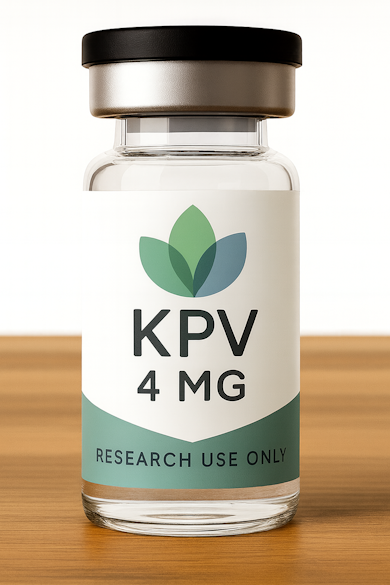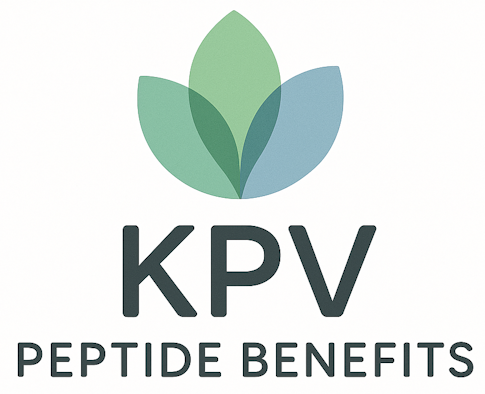KPV peptide is a potent anti inflammatory compound derived from alpha melanocyte stimulating hormone (α-MSH). Composed of three amino acids — lysine, proline, and valine — this short chain tripeptide exhibits strong anti inflammatory properties that help regulate immune activity, reduce cytokine signaling, and promote tissue recovery across the gastrointestinal tract, skin, and other organ systems.
Mechanism of Action

At the molecular and cellular level, KPV interacts directly with melanocortin receptors, particularly MC1R, located on immune cells and both intestinal epithelial cells. When KPV is administered, it triggers signaling cascades that downregulate pro inflammatory cytokines such as TNF-α and IL-6 while enhancing immune balance and immune support. These receptor interactions lead to suppression of inflammatory pathways and modulation of mast cell activation syndrome, ultimately helping to regulate inflammation and promote tissue repair.
Unlike many anti inflammatory drugs that may cause adrenal suppression or increase infection risk, KPV peptide therapy works in harmony with the body’s natural healing processes by stimulating melanocortin-based signaling and regulating immune responses rather than shutting them down. This makes KPV safe for long-term peptide therapy targeting chronic inflammation, autoimmune disorders, and other inflammatory conditions.
For details on laboratory research administration and recommended microgram ranges, see our KPV Peptide Dosage chart for men and women.
Cellular Transport and Receptor Signaling
Once KPV is administered, typically via subcutaneous injection, the peptide rapidly binds to melanocyte stimulating hormone α receptors within the immune system and gut lining. Through this interaction, it influences intracellular cAMP signaling and reduces inflammation across inflammatory bowel tissues. This process is vital in conditions such as ulcerative colitis, Crohn’s disease, and other inflammatory bowel conditions, where systemic inflammation and gut inflammation damage the intestinal barrier.
In animal models and therapeutic peptides research, KPV has shown the ability to accelerate mucosal healing, promote mucosal healing, and enhance wound healing within the intestinal epithelial cells. These mechanisms help restore gut health, strengthen the gut lining, and combat leaky gut, which is often linked to histamine intolerance, immune imbalance, and chronic pain syndromes.
Anti-Inflammatory and Healing Effects
The benefits of KPV extend far beyond digestion. To understand its full safety profile and tolerability, review our KPV Peptide Side Effects overview. Its anti inflammatory benefits make it useful for skin conditions such as eczema, psoriasis, and dermatitis, as well as joint pain and lyme disease-related inflammation. By reducing inflammation and supporting gut health, the peptide helps the body’s ability to maintain immune function, immune balance, and overall skin health.
Furthermore, KPV peptide works synergistically with other therapeutic peptides such as BPC 157 to enhance wound healing, promoting healing, and tissue repair at the site of injury. Studies suggest that this combination can reduce inflammation, fight inflammation, and enhance healing in both the gut and systemic tissues.
You can read a direct comparison between these two compounds in our article on KPV Peptide vs BPC-157.
Frequently Asked Questions
How long does it take for KPV peptide to work?
The effects of KPV peptide can vary depending on the individual, dosage, and method of administration. When KPV is administered through subcutaneous injection, some users may notice early improvements in gut health and skin conditions within one to two weeks. However, deeper anti inflammatory and immune system benefits—such as reduced systemic inflammation, improved immune function, and faster tissue repair—often become more apparent after several weeks of consistent KPV peptide therapy. In clinical and animal models, results are typically observed after steady downregulation of pro inflammatory cytokines and restoration of immune balance.
Who should not use KPV peptides?
Although KPV peptide is generally considered KPV safe, it may not be suitable for everyone. Individuals with severe autoimmune disorders, those taking potent many anti inflammatory drugs, or anyone with adrenal suppression should speak with a healthcare provider before beginning peptide therapy. Pregnant or breastfeeding women should also avoid KPV therapy, as data on its safety in these populations is limited. People with significant immune imbalance or chronic infections should only use KPV administered peptides under medical supervision to prevent potential interference with immune response regulation.
Does KPV heal the gut?
Yes. One of the primary benefits of KPV peptide is its ability to support gut health and heal the gut lining. It has demonstrated strong anti inflammatory properties within the gastrointestinal tract, helping to counter gut inflammation, intestinal inflammation, and leaky gut. Through modulation of inflammatory pathways and suppression of pro inflammatory cytokines, KPV reduces inflammation in the intestines and promotes tissue repair and wound healing. These actions can be particularly beneficial for those with inflammatory bowel disease, ulcerative colitis, Crohn’s disease, or other inflammatory bowel disorders. When combined with complementary therapeutic peptides such as BPC 157, it can further enhance healing and accelerate mucosal healing in the intestinal epithelial cells.
Is KPV worth it?
For individuals struggling with chronic inflammation, inflammatory bowel conditions, or persistent skin conditions, KPV peptide therapy can be a powerful, natural alternative to many anti inflammatory drugs. It offers significant anti inflammatory benefits while supporting the body’s natural healing processes without the side effects often associated with pharmaceuticals. Those seeking to reduce inflammation, improve immune support, and restore gut health often find that KPV peptide helps them regain balance in the immune system and enhances the healing process overall. While each person’s response may vary, research and experience indicate that KPV peptide is well worth considering as part of a holistic peptide therapy plan under guidance from a qualified healthcare provider.
Clinical Applications and Safety
KPV peptide therapy has gained attention for helping patients with inflammatory bowel disease, mast cell activation syndrome, and chronic inflammation. It works by downregulating pro inflammatory cytokines, restoring immune function, and limiting systemic inflammation without suppressing cortisol or compromising the immune response.
Because KPV stands for lysine-proline-valine, which are the amino acids that make up this natural fragment of stimulating hormone α MSH, it mimics the body’s own anti-inflammatory signaling. Under the guidance of a healthcare provider, KPV therapy can help support gut health, enhance immune support, and reduce inflammation related to inflammatory conditions, inflammatory bowel, or skin health concerns.
For verified research suppliers and reputable sources, check our guide on where to buy KPV peptide online.
In short, what is KPV peptide? It is a natural, anti inflammatory tripeptide that offers significant anti inflammatory benefits by helping reduce inflammation, balance the immune system, and stimulate the healing process across multiple tissues — making it one of the most promising peptide therapy options for restoring gut health and promoting healing from the inside out.
Learn more about its broad therapeutic applications on our KPV Peptide Benefits homepage.
